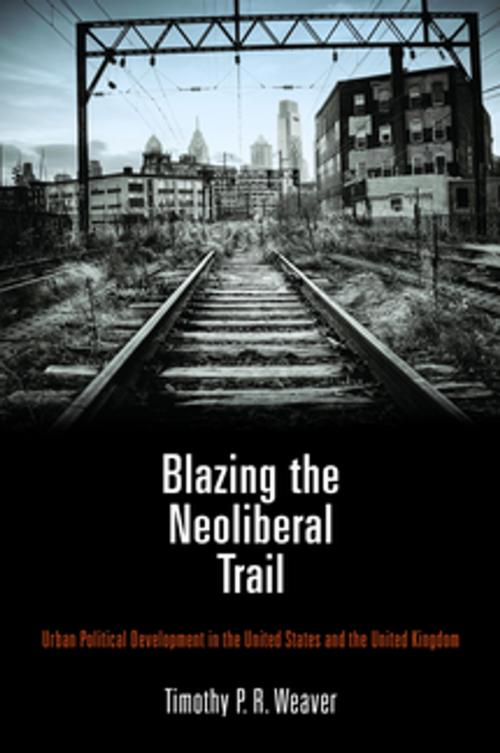Blazing the Neoliberal Trail
Urban Political Development in the United States and the United Kingdom
Nonfiction, Social & Cultural Studies, Political Science, International, Foreign Legal Systems, Government, Social Policy| Author: | Timothy P. R. Weaver | ISBN: | 9780812292220 |
| Publisher: | University of Pennsylvania Press, Inc. | Publication: | December 4, 2015 |
| Imprint: | University of Pennsylvania Press | Language: | English |
| Author: | Timothy P. R. Weaver |
| ISBN: | 9780812292220 |
| Publisher: | University of Pennsylvania Press, Inc. |
| Publication: | December 4, 2015 |
| Imprint: | University of Pennsylvania Press |
| Language: | English |
In Blazing the Neoliberal Trail, Timothy Weaver asks how and why urban policy and politics have become dominated, over the past three decades, by promarket thinking. He argues that politicians such as Ronald Reagan and Margaret Thatcher targeted urban areas as part of their far broader effort to remake the relationship between markets, states, and citizens. But while neoliberal policies were enacted in both the United States and the United Kingdom, Weaver shows that there was significant variation in the ways in which neoliberal ideas were brought to bear on institutional frameworks and organized interests. Moreover, these developments were not limited to a 1980s right-wing effort but were also advanced by Bill Clinton and Tony Blair, whose own agendas ultimately reinforced neoliberal ideas and practices, though often by default rather than design. The enduring impact of these shifts is evidenced today by the reintroduction of enterprise zones in the United Kingdom by Chancellor of the Exchequer George Osborne and by President Obama's announcement of Promise Zones, which, despite appearances, are cast in the neoliberal mold.
By highlighting the bipartisan nature of the neoliberal turn, Weaver challenges the dominant narrative that the revival of promarket policies was primarily driven by the American GOP and the United Kingdom's Conservative Party. Drawing on extensive archival research and interviews with key political actors, Weaver examines national-level policies, such as enterprise zones—place-based articulations of neoliberal ideas—in case studies of Philadelphia and London. Through an investigation of national urban policy and local city politics, Blazing the Neoliberal Trail shows how elites became persuaded by neoliberal ideas and remade political institutions in their image.
In Blazing the Neoliberal Trail, Timothy Weaver asks how and why urban policy and politics have become dominated, over the past three decades, by promarket thinking. He argues that politicians such as Ronald Reagan and Margaret Thatcher targeted urban areas as part of their far broader effort to remake the relationship between markets, states, and citizens. But while neoliberal policies were enacted in both the United States and the United Kingdom, Weaver shows that there was significant variation in the ways in which neoliberal ideas were brought to bear on institutional frameworks and organized interests. Moreover, these developments were not limited to a 1980s right-wing effort but were also advanced by Bill Clinton and Tony Blair, whose own agendas ultimately reinforced neoliberal ideas and practices, though often by default rather than design. The enduring impact of these shifts is evidenced today by the reintroduction of enterprise zones in the United Kingdom by Chancellor of the Exchequer George Osborne and by President Obama's announcement of Promise Zones, which, despite appearances, are cast in the neoliberal mold.
By highlighting the bipartisan nature of the neoliberal turn, Weaver challenges the dominant narrative that the revival of promarket policies was primarily driven by the American GOP and the United Kingdom's Conservative Party. Drawing on extensive archival research and interviews with key political actors, Weaver examines national-level policies, such as enterprise zones—place-based articulations of neoliberal ideas—in case studies of Philadelphia and London. Through an investigation of national urban policy and local city politics, Blazing the Neoliberal Trail shows how elites became persuaded by neoliberal ideas and remade political institutions in their image.















